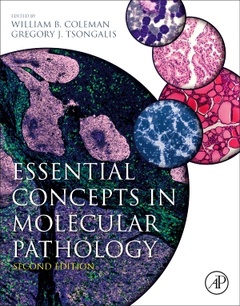Essential Concepts in Molecular Pathology (2nd Ed.)
Coordonnateurs : Coleman William B., Tsongalis Gregory J.

Essential Concepts in Molecular Pathology, Second Edition, offers an introduction to molecular genetics and the "molecular" aspects of human disease. The book illustrates how pathologists harness their understanding of these entities to develop new diagnostics and treatments for various human diseases. This new edition offers pathology, genetics residents, and molecular pathology fellows an advanced understanding of the molecular mechanisms of disease that goes beyond what they learned in medical and graduate school.
By bridging molecular concepts of pathogenesis to the clinical expression of disease in cell, tissue and organ, this fully updated, introductory reference provides the background necessary for an understanding of today?s advances in pathology and medicine.
PART I Essential Pathology - Mechanisms of Disease 1. Molecular Mechanisms of Cell Death 2. Acute and Chronic Inflammation 3. Infection and Host Response 4. Neoplasia
PART II Concepts in Molecular Biology and Genetics 5. Basic Concepts in Human Molecular Genetics 6. The Human Genome: Implications for the Understanding of Human Disease 7. The Human Transcriptome: Implications for the Understanding of Human Disease 8. The Human Epigenome: Implications for the Understanding of Human Disease 9. Clinical Proteomics and Molecular Pathology 10. Integrative Systems Biology: Implications for the Understanding of Human Disease 11. Pathology: The Clinical Description of Human Disease 12. Molecular Pathogenesis: The Biological Basis of Human Disease and Implications for Improved Treatment of Human Disease 13. Integration of Molecular and Cellular Pathogenesis
PART IV Molecular Pathology of Human Disease 14. Molecular Basis of Cardiovascular Disease 15. Molecular Basis of Hemostatic and Thrombotic Diseases 16. Molecular Basis of Lymphoid and Myeloid Diseases 17. Molecular Basis of Diseases of Immunity 18. Molecular Basis of Pulmonary Disease 19. Molecular Basis of Diseases of the Gastrointestinal Tract 20. Molecular Basis of Liver Disease 21. Molecular Basis of Diseases of the Exocrine Pancreas 22. Molecular Basis of Diseases of the Endocrine System 23. Molecular Basis of Gynecologic Diseases 24. Molecular Pathogenesis of Kidney Diseases 25. Molecular Pathogenesis of Prostate Cancer: Somatic, Epigenetic, and Genetic Alterations 26. Molecular Biology of Breast Cancer 27. Molecular Basis of Skin Disease 28. Molecular Pathology: Neuropathology
PART V Practice of Molecular Medicine 29. Molecular Diagnosis of Human Disease 30. Molecular Assessment of Human Disease in the Clinical Laboratory 31. Pharmacogenomics and Personalized Medicine in the Treatment of Human Disease
- Explains the practice of "molecular medicine" and the translational aspects of molecular pathology, including molecular diagnostics, molecular assessment and personalized medicine
- Orients non-pathologists on what pathologists look for and how they interpret their observational findings based on histopathology
- Provides the reader with what is missing from most targeted introductions to pathology—the cell biology behind pathophysiology
Date de parution : 11-2019
Ouvrage de 634 p.
21.4x27.6 cm
Thèmes d’Essential Concepts in Molecular Pathology :
Mots-clés :
?Acute kidney injury; Acute myeloid leukemia; Adaptive immunity; Adrenal gland; Adrenocorticotropic hormone; Adverse drug reaction; Alcoholic liver disease; Allergic contact dermatitis; Alterations of bone matrix; Analyte; Androgen receptor; Anemia; Aneurysm; Antibody; Apoptosis; Apoptosome; Apoptotic body; Atherosclerosis; Atopic dermatitis; Autoimmunity; Autophagy; B lymphocyte; B-cell clonality; B-cell lymphoma-2 (Bcl2) family of pro-apoptotic and anti-apoptotic proteins; Biomarker; Biomedicine; Blebbing; Bone infections; Bone remodeling; Bone tumors and metastases; Breast cancer; CFTR; CLIA; Calcific aortic stenosis; Cancer; Carcinogenesis; Cardiomyopathy; Caspase; Cathepsin B; Cell therapy; Cellular proliferation; Central nervous system; Cervical cancer; Chemoattractants; Chromosomal translocations; Chromosomes; Chronic disease; Chronic kidney disease; Cirrhosis; Clotting factors; Concepts; Copy number; Crosstalk between apoptosis and necrosis; Cryopyrin; Cutaneous T-cell lymphoma; Cystic fibrosis; Cytochrome c; Cytokines; DNA methylation; DNA-based microarrays; Damage-associated molecular patterns (DAMPs); Data mining; Databases; Death receptor; Death-inducing signaling complex (DISC); Definitions; Diagnostic pathology; ER stress; ESR1; Endometrial cancer; Endothelial cell; Epidermolysis bullosa; Epigenetic mechanisms; Epigenetic regulation; Epigenetics; Exosomes; FDA; Ferroptosis; Fibrosis; Fragile X; Gastrointestinal disorders; Gene expression; Gene expression profiling; Genetic skin diseases; Genetic testing; Genodermatosis; Genomics; Gonadotropin; Growth hormone; HCV infection; HER2; Hematopoiesis; Hemophilia; Hemostasis; Hepatic fibrosis; Hepatitis; Hepatitis C virus; Hepatocellular cancer; Hepatocyte death; Histone modification


